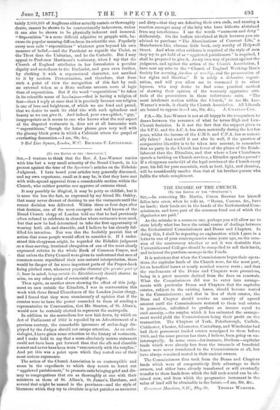(To THE EDITOR OF THE " SPECTATOR."]
Sut,-1 venture to think that the Rev. J. Lee-Warner carries with him but a very small minority of the Broad Church, in his protest against the tone of the Spectator's articles on the Ridsdale .Judgment. I have heard your articles very generally discussed, and my own experience, small as it may be, is that they have met with wide-spread approval from a considerable section within the Church, who neither practise nor approve of extreme ritual.
It may possibly be illogical, it may be petty or childish, but it is none the less the fact, as expressed by my friend Mr. Oakley, that many never dreamt of desiring to use the vestments until the recent decision was delivered. Within three or four days after that decision, one of the most energetic and well known of the Broad Church clergy of London told me that he had previously often refused to celebrate in churches where vestments were used, but that now he bad determined to take the first opportunity of wearing both alb and chasuble, and 1 believe he has already ful- filled his intention. Nor was this the foolishly peevish line of action that some people would affect to consider it. If I under- stood this clergyman aright, he regarded the Ridsdale judgment as a time-serving, irrational abrogation of one of the most clearly expressed rubrics in the whole Book of Common Prayer, and that unless the Privy Council were given to understand that men of common-sense repudiated their non-natural interpretation, there would be danger of far more important parts of the Prayer-book being pitched over, whenever popular clamour (the greater part of -it, bear in mind, being outside the Establishment) should chance to arise, on any other point of ceremonial or dogma.
Then again, as another straw showing the effect of this judg- ment on men outside the Ritualists, I was in conversation this week with three Broad Churchmen of the London junior clergy, and I found that they were unanimous!y of opinion that if the curates were to have the power conceded to them of sending a representative to Convocation, that Mr. Stanton, of St. Alban's, would now be certainly elected to represent the metropolis.
In addition to the marvellous law now laid down, by which an Act of Parliament of 1662 is repealed by an Advertisement of a previous century, the remarkable ignorance of archwology dis- played by the Judges should not escape attention. As an eccic- siologist, I have given some attention to the history of vestments, and I make bold to say that a more absolutely untrue statement could not have been put forward than that the alb and chasuble cannot and never have been worn "concurrently with the surplice." And yet this was a point upon which they rested one of their most serious arguments.
The action of the Church Association is so contemptible and mean 'in the expedients to which they resort to ferret out "aggrieved parishioners," to promote suits bringing grief and dis- may to congregations that are as thoroughly at one with their ministers as those of St. Alban's, St. James's, Hatcham, and several that might be named in the provinces—and the style of literature which they try to circulate in quiet parishes so nauseous and dirty—that they are defeating their own ends, and causing a reaction amongst many of the laity who have hitherto abstained from any interference. I use the words "nauseous and dirty" deliberately. On the leaflets circulated at their lectures you are advised to purchase "The Abominations of Convent Life," a Munchausen-like, obscene little book, only worthy of Ilolywell Street. And when other evidence is required of the style of men they try to get bold of as " aggrieved parishioners " is required, I shall be prepared to give it. As my own way of protest against the judgment, and against the action of the Church Association, I have sent my mite to the " Church of England Working-Men's Society for securing freedom of worship, and the preservation of her rights and liberties." It is solely a defensive organi- sation, and will you allow me to commend it to other laymen, who may desire to find some practical method of showing their opinion of the wantonly aggressive atti- tude of the prosecutors in these unfortunate suits. "The most intolerant section within the Church," to use Mr. Lee- Warner's words, is clearly the Church Association. All Liberals
are bound to oppose it.—I am, Sir, &c., J. CHARLES Cox.
P.S.—Mr. Lee-Warner is not at all happy in the comparison he draws between the revenues of what he terms High and Low- Church Societies. Is it not the fact that the support given to the S.P.G. and the A.C.A. has risen materially during the isst few years, whilst the income of the C.M.S. and C.P.A. has as materi- ally fallen ? And would it not also be well, if the question of comparative liberality is to be taken into account, to remember that no party in the Church has fewer of the plums of the Estab- lishment than the Ritualists, and that where a Low Churchman spends a farthing on Church services, a Ritualist spends a pound ? If a clergyman omits 624 of the legal services of the Church every year, his bill for pure essentials, such as heat, light, and cleaning, will be considerably smaller than that of his brother-parson who fulfils the whole complement.


































 Previous page
Previous page